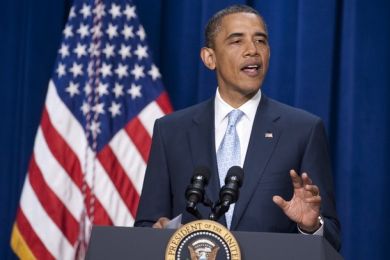Sudan rejects Obama’s warnings over South Kordofan escalation
June 15, 2011 (KHARTOUM) – The Sudanese government has rejected warnings by U.S Barack Obama that it will face international isolation if it does not “immediately” cease its military actions in the country’s central state of South Kordofan.

Thousands of people, 60,000 according to the UN, are believed to have been displaced by the fighting which is mainly occurring in and around the state’s capital of Kadugli. Local human rights organizations also spoke of wanton killings, summary executions, and mass detention of Nuba population sympathetic with the SPLA.
In a recorded message on Wednesday, US President Barack Obama expressed his country’s deep concern by the unfolding crisis in South Kordofan and warned the Sudanese government against the consequences of its actions.
“There is no military solution…the government of Sudan must prevent a further escalation of this crisis by ceasing its military actions immediately, including aerial bombardment, forced displacement and campaigns of intimidation.”
Obama demanded that the government allows aid workers to access the area and reminded both north and south Sudan of their obligations under the Comprehensive Peace Agreement (CPA), whose signing in 2005 ended more than two decades of north-south civil wars and paved the way for the conduct of south Sudan referendum on independence in January. South Sudan voted overwhelmingly to secede and form an independent state in July.
“Both sides must agree to end the violence, allow freedom of movement for aid workers and to fulfill commitments under CPA and resolve differences peacefully.”
Obama once again employed the use of carrot-and-stick policy, telling Sudanese leaders that if they choose to fulfill their obligation, the United States will take steps towards normalization of relations.
“However”, Obama warned, “those who flout their international obligations will face more pressure and isolation and they will be held accountable for their actions.”
In Khartoum, the official spokesman of Sudan’s Ministry of Foreign Affairs, Al-Ubayid Adam Muroah, accused Obama of failing to assign blame to South Sudan, and demanded that Washington ceases its policy of intimidation against the Sudanese government.
“The US knows of all people that it was South Sudan’s ruling SPLM that started the military escalation and attacked local police,” he said in a statement published by the country’s official news agency SUNA on Thursday.
The spokesman said that the government was committed to preserving peace and stability in the country but not because of fear from the US or pursuit of normalized ties with Washington.
“What the government has done was in response to violations and aggression [by the SPLM],” he added.
(ST)
